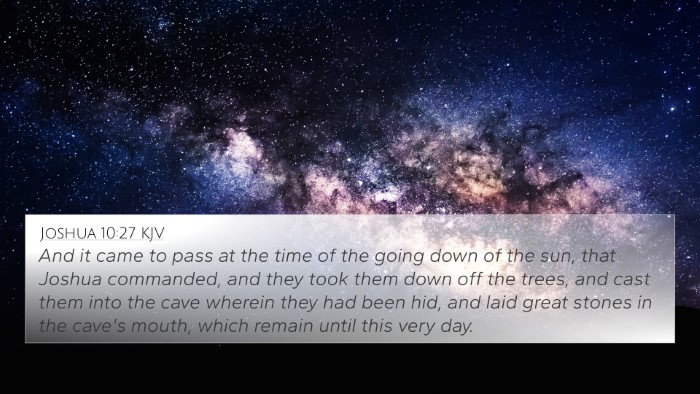Interpretation of Joshua 7:26
Joshua 7:26 narrates a critical event in the history of Israel, following the sin of Achan, who disobeyed God's command by taking spoils from Jericho. The verse emphasizes the dire consequences of sin within the covenant community and highlights God's justice in dealing with transgressions.
Summary of Insights from Public Domain Commentaries
The combined insights from prominent public domain commentaries such as those by Matthew Henry, Albert Barnes, and Adam Clarke provide a multifaceted understanding of this verse.
Understanding the Context
Joshua 7:26 occurs after the Israelites suffer defeat at Ai due to sin in the camp. The context reveals the importance of holiness among God's people and the severe repercussions of disobedience. Both Matthew Henry and Albert Barnes emphasize that God's anger was kindled against Israel due to Achan's sin, affecting the entire community.
Consequences of Disobedience
Matthew Henry highlights that Achan’s sin not only brought about his death but also showed that sin cannot be hidden from God. The consequences are immediate and significant: "And they raised over him a great heap of stones unto this day," signifying a permanent reminder of the cost of rebellion against divine commands.
God's Justice and Mercy
Albert Barnes points out that while God's justice is evident in the punishment of Achan, there's also an implicit invitation to reflect on His mercy, which patiently leads His people toward repentance. The heap of stones is symbolic, serving also as a testament to God's holiness and the seriousness of sin.
The Importance of Community Accountability
Adam Clarke illustrates that Achan’s individual transgression had corporate ramifications. Clarke remarks, "Israel collectively bore the effects of Achan's sin," suggesting that believers today should remain vigilant about personal conduct as it impacts the wider community of faith.
Cross-References to Consider
- Numbers 32:23: "But if ye will not do so, behold, ye have sinned against the LORD; and be sure your sin will find you out." - Highlighting the inevitability of sin being exposed.
- Galatians 6:7: "Be not deceived; God is not mocked: for whatsoever a man soweth, that shall he also reap." - Emphasizing the principle of divine justice.
- Joshua 1:18: "Whosoever he be that doth rebel against thy commandment, and will not hearken unto thy words in all that thou commandest him, he shall be put to death." - Showing seriousness of obedience to God's commands.
- Hebrews 12:15: "Looking diligently lest any man fail of the grace of God; lest any root of bitterness springing up trouble you, and thereby many be defiled," - Relating to the communal impact of individual sin.
- James 1:15: "Then when lust hath conceived, it bringeth forth sin: and sin, when it is finished, bringeth forth death." - Illustrating the progression of sin’s consequences.
- Proverbs 14:34: "Righteousness exalteth a nation: but sin is a reproach to any people." - The broader societal implications of sin and obedience.
- Revelation 2:5: "Remember therefore from whence thou art fallen, and repent, and do the first works; or else I will come unto thee quickly, and will remove thy candlestick out of his place, except thou repent." - A call towards remembrance and repentance for communal integrity.
Conclusion
Joshua 7:26 serves as a profound reminder of the principles of divine justice, community accountability, and the serious nature of sin. It encourages readers to reflect on their own lives and the broader implications of individual actions within the body of believers. The cross-references drawn from both the Old and New Testaments enhance the understanding of this theme, revealing a cohesive biblical narrative on sin, judgment, and the need for repentance.
Final Thoughts
The verse provides a launching point for deeper study into the connections between scripture, how God's commands are addressed throughout the Bible, and the consequences that follow disobedience. Utilizing tools for Bible cross-referencing, readers can further explore these themes and gain a richer understanding of their faith.
















